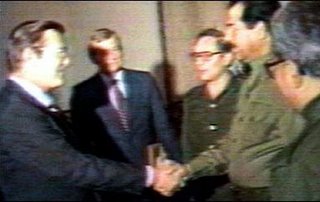On Appeasement

Donald Rumsfeld and Saddam Hussein (Dec. 1983)
LA Times, 8/30/06:
By likening today's U.S. foreign policy to that
during World War II and the Cold War,
Rumsfeld sought to portray skeptics of the Bush
administration as being on the wrong side of
history. He ridiculed American officials who had
hoped to negotiate with Adolf Hitler.
"Once again, we face similar challenges in
efforts to confront the rising threat of a new
type of fascism," Rumsfeld said. "But some
seem not to have learned history's lessons."
He continued, "Can we truly afford to believe that,
somehow or someway, vicious extremists could
be appeased?"
Another history lesson from Frank Rich:
Mr. Rumsfeld didn’t go to Baghdad in 1983 to
tour the museum. Then a private citizen, he had
been dispatched as an emissary by the Reagan
administration, which sought to align itself with
Iraq in the Iran-Iraq war. Saddam was already
a notorious thug. Well before Mr. Rumsfeld’s
trip, Amnesty International had reported the
dictator’s use of torture — “beating, burning,
sexual abuse and the infliction of electric
shocks” — on hundreds of political prisoners.
Dozens more had been summarily executed or
had “disappeared.” American intelligence
agencies knew that Saddam had used chemical
weapons to gas both Iraqi Kurds and Iranians.
According to declassified State Department
memos detailing Mr. Rumsfeld’s Baghdad
meetings, the American visitor never raised the
subject of these crimes with his host. (Mr.
Rumsfeld has since claimed otherwise, but that
is not supported by the documents, which can
be viewed online at George Washington
University’s National Security Archive.) Within
a year of his visit, the American mission was
accomplished: Iraq and the United States
resumed diplomatic relations for the first time
since Iraq had severed them in 1967 in protest
of American backing of Israel in the Six-Day
War.
In his speech last week, Mr. Rumsfeld
paraphrased Winston Churchill: Appeasing
tyrants is “a bit like feeding a crocodile, hoping
it would eat you last.” He can quote Churchill all
he wants, but if he wants to self-righteously use
that argument to smear others, the record
shows that Mr. Rumsfeld cozied up to the
crocodile of Baghdad as smarmily as anyone. To
borrow the defense secretary’s own
formulation, he suffers from moral confusion
about Saddam.


<< Home